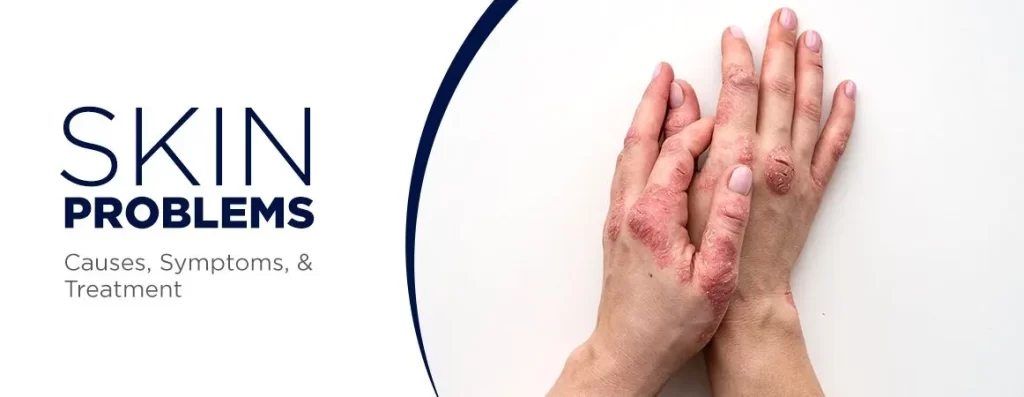Understanding Skin Problems
Skin problems encompass a wide range of conditions affecting the skin’s appearance, texture, and function. From minor irritations to chronic diseases, these issues can arise due to various factors, including genetics, environmental triggers, lifestyle choices, and underlying health conditions. While some skin problems are temporary and mild, others may require medical intervention for proper management.
Causes of Skin Problems
The causes of skin problems are diverse and multifaceted. Environmental factors such as exposure to UV radiation, pollutants, and harsh chemicals can damage the skin and contribute to issues like premature aging, pigmentation disorders, and dermatitis.
- Genetic Factors: Inherited traits can predispose individuals to certain skin conditions, such as eczema, psoriasis, and acne.
- Environmental Triggers: Exposure to UV radiation, pollutants, allergens, and harsh chemicals can damage the skin and exacerbate existing conditions.
- Lifestyle Choices: Poor skincare habits, smoking, excessive alcohol consumption, and an unhealthy diet can compromise skin health and contribute to the development of various skin problems.
- Underlying Health Conditions: Certain medical conditions, such as hormonal imbalances, autoimmune disorders, and metabolic diseases, can manifest as skin issues.
Symptoms of Skin Problems
The symptoms of skin problems vary depending on the specific condition but may include:
- Redness, itching, or inflammation
- Dryness, flakiness, or scaling
- Bumps, blisters, or lesions
- Pain or discomfort
- Changes in skin color or texture
- Excessive oiliness or greasiness
- Sensitivity to touch or environmental factors
Common Skin Problems
Face skin problems and skin diseases encompass a broad spectrum of conditions, ranging from minor annoyances to chronic, debilitating disorders. Among the most typical skin conditions are:
Face Skin Problems:
The face is particularly prone to various skin issues due to its exposure to environmental factors and frequent contact with skincare products. Common face skin problems include acne, rosacea, eczema, and hyperpigmentation.
Skin Diseases:
Skin diseases encompass a broad spectrum of conditions, ranging from mild to severe. Examples include psoriasis, dermatitis, vitiligo, and skin cancer.
Skin Allergies:
Skin allergy occurs when the immune system overreacts to allergens, triggering symptoms such as itching, redness, swelling, and rash. Common skin allergies include contact dermatitis, urticaria (hives), and atopic dermatitis (eczema).
Skin Infections:
Skin infections occur when microorganisms, such as bacteria, fungi, or viruses, invade the skin’s layers, causing inflammation and discomfort. Common skin infections include bacterial infections (e.g., cellulitis), fungal infections (e.g., ringworm), and viral infections (e.g., herpes simplex).
- Acne: Characterized by pimples, blackheads, and whiteheads due to clogged pores and bacterial overgrowth.
- Eczema: A chronic inflammatory condition causing redness, itching, and dry, scaly patches on the skin.
- Psoriasis: An autoimmune disorder characterized by thick, scaly plaques and red patches on the skin.
- Rosacea: A chronic inflammatory condition causing facial redness, flushing, and visible blood vessels.
- Dermatitis: It is an inflammatory skin condition that causes redness, itchiness, and rashes after coming into touch with allergens or irritants.
- Hyperpigmentation: Darkening of the skin due to excess melanin production, often triggered by sun exposure, hormonal changes, or injury.
- Skin cancer: Abnormal growth of skin cells due to DNA damage from UV radiation, leading to the formation of malignant tumors.
Treatment Options
Treatment for skin problems depends on the underlying cause, severity of symptoms, and individual factors. Common treatment modalities include:
- Topical medications: Creams, ointments, or gels containing active ingredients like retinoids, corticosteroids, antibiotics, or antifungals to target specific skin issues.
- Oral medications: Prescription drugs such as antibiotics, antihistamines, or oral retinoids may be prescribed for more severe or systemic skin problems.
- Phototherapy: Exposure to ultraviolet light under medical supervision to treat conditions like psoriasis, eczema, and vitiligo.
- Laser therapy: Targeted laser treatment to address various skin concerns, including acne scars, pigmentation disorders, and vascular lesions.
- Lifestyle modifications: Adopting healthy habits such as proper skincare, sun protection, stress management, and a balanced diet can help improve overall skin health and prevent future problems.
Conclusion:
Face skin problems and skin diseases encompass a wide range of conditions with diverse causes and symptoms. Understanding the underlying factors contributing to these issues is essential for effective treatment and management. By adopting a holistic approach that addresses both internal and external factors, individuals can achieve healthier, radiant skin and enhance their overall well-being.

